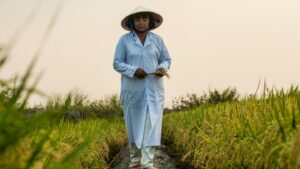Governments around the world, from Africa to China and Vietnam, are turning their attention toward genetically modified crops and looking at how they can benefit from the adoption of this proven technology.
STATUS AFRICA
The International Food Policy Research Institute, in partnership with the African Development Bank, released a report GM agricultural technologies for Africa: A state of affairs. According to the report, Africa needs to embrace agricultural innovations to compete globally. The authors provide information on the status of biotechnology in Africa, with an emphasis on genetically modified crops, and assess the opportunities offered by and constraints on adoption.
The report also discusses the need to transform African agriculture from low productivity to one that drives economic development. The authors identified several initiatives that could help overcome obstacles, such as increasing public investments in agricultural biotechnology research and development, improving regulatory frame-works and capacity, and developing an effective communications strategy.
Judith Chambers, José Falck-Zepeda, Guillaume Gruère, Karen Hokanson, Debdatta Sengupta and Patricia Zambrano authored the report. They present a comprehensive, evidence-based situation analysis that outlines the role biotechnology could have in Africa’s agricultural development with a pathway forward.
The authors write: “In developing this review we noted a number of clear gaps and needs that, with targeted and sustained efforts and resources, could be addressed to create a pathway for progress in demystifying the technology. Chief among these was the recognition that accurate and recent data are seriously deficient on many of the issues touched upon in this report — capacity, financing, the economic impacts of various crops, scientific infrastructure, political understanding and societal attitudes and perceptions. This presents an immediate problem for prioritizing action plans and resource allocations, because decisions made anytime soon will be based on incomplete or possibly inaccurate delineation of the problems and opportunities at hand.
“Based on this review, inadequate funding of public agricultural research and development (R&D) on biotechnology and genetic modification (GM) technology and lack of capacity in regulatory systems to inform the decisionmaking process about biotechnology are paramount issues in Africa. These issues need urgent attention, despite a number of initiatives that are under way. To enhance the availability of GM varieties suited to Africa, increased public investment in agricultural R&D for biotechnology, including the breeding of GM crops, is essential. To guarantee science-based regulation of new GM varieties, appropriate regulatory systems are needed. Only seven African countries have functional regulatory frameworks … Expanded efforts are needed to build practical, functioning frameworks in additional countries.”
For the full report, visit the International Food Policy Research Institute at ifpri.org.
STATUS AUSTRALIA
During a Grains Research and Development Corporation (GRDC) tour, Central Queensland growers demonstrated they could adapt to production challenges. “Many of the growers we met with are combatting difficult production issues, such as herbicide resistance, finding suitable rotational cropping options and soil fertility decline, by implementing industry-leading best management practices and using new, better adapted crop varieties,” says Keith Harris, GRDC northern region panelist.
Harris says the difference in approach is marked compared to the panel’s previous visit in 2011. “The efforts of growers and consultants should be applauded,” he says.
“One of the most impressive aspects of the visit was the adoption of better crop rotation, with a significant increase in the use of chickpeas and mungbeans,” Harris says. He reports that growers expressed appreciation of GRDC-funded research into new pulse crop varieties, particularly the endeavors of Col Douglas from Queensland’s Department of Agriculture, Fisheries and Forestry and Kristy Hobson from the New South Wales Department of Primary Industries in Tamworth in developing pulse varieties better suited to the Central Queensland environment.
“The GRDC remains committed to directing investment into projects that directly support the grains industry in Central Queensland,” Harris says. Some of the feedback he received was the need for sound recommendations on pulse crop agronomy, including seed rates, row spacing, sowing times, planting depths, weed control, nutrition, appropriate plant back intervals and desiccation options.
STATUS CHINA
In an attempt to stifle anti-GMO sentiment that has gathered momentum, the Chinese government announced that it will kick off a media campaign supporting genetically modified crops to aid its goal of food security.
China’s agriculture ministry will use television, newspapers and the Internet to educate the general public about GMOs. The agriculture ministry reported that it would create “a social atmosphere which is beneficial for the healthy development of the genetically-modified industry.”
On Oct. 10, agriculture minister Han Changfu said that the Chinese people should keep their “rice bowls” in their own hands to ensure food security, as massive grain imports will be unsustainable for the nation.
In an article published by the Quishi Journal, the flagship magazine of the Communist Party of China Central Committee, Han said the task to ensure food security remains difficult given the country’s population of 1.3 billion and a tight grain supply.
China has placed importance on the development of modern biotechnology but keeps a wary eye on the possible risks that might result from the technology. In May of this year, the Ministry of Agriculture of the People’s Republic of China said it would strengthen oversight of GMOs in the agricultural sector to ensure biosafety. In a statement, the ministry said “regulatory oversight of such products is important to grain safety, food safety and ecological safety.” In that same statement, it vowed to crack down on the illegal spread of GMO seeds and other malpractice.
STATUS VIETNAM
At a conference in early October, the head of Vietnam’s Academy of Agricultural Sciences, Pham Van Toan, said he wanted to start cultivating new strains of genetically modified crops in 2015, with a goal of expanding GM crop cultivation by 30 per cent to 50 per cent of total farmland by 2020.
Despite differing opinions around the use of GM crops, the Ministry of Agriculture and Rural Development approved the use of four strains of GM corn to produce food for humans and feed for livestock in August. Then, in early October, the Ministry of Natural Resources and Environment decided to issue the Certificate of Biosafety for the GM corn variety MON89034 of Dekalb Vietnam Co. Ltd., a subsidiary of Monsanto.
Such moves by the two ministries indicate the support for GM crops by central authorities.
The acreage of GM corn in the world is expanding fast and so far, there has been no evidence proving the GM food has negative impact on human health, said Nguyen Lan Dung, a scientist at the conference. “We have to import biotech corn and soybean, so why don’t we grow them ourselves?” he asked.
Minister of Agriculture Cao Duc Phat said previously that genetic modification technology is a major achievement of humankind, which Vietnam should not miss, and that the agriculture ministry will continue to study and evaluate the cultivation of GM crops.
Tran Dinh Long, chairman of the Vietnam Seed Trade Association, told an earlier conference on restructuring agriculture that the GM strain approved by the ministries of agriculture and natural resources environment is resistant to flies and herbicides. However, those specialties of the corn variety cannot guarantee sufficient material supply for livestock feed. Greater problems facing corn cultivation are drought and lack of equipment. — Source SGT/VNN
















